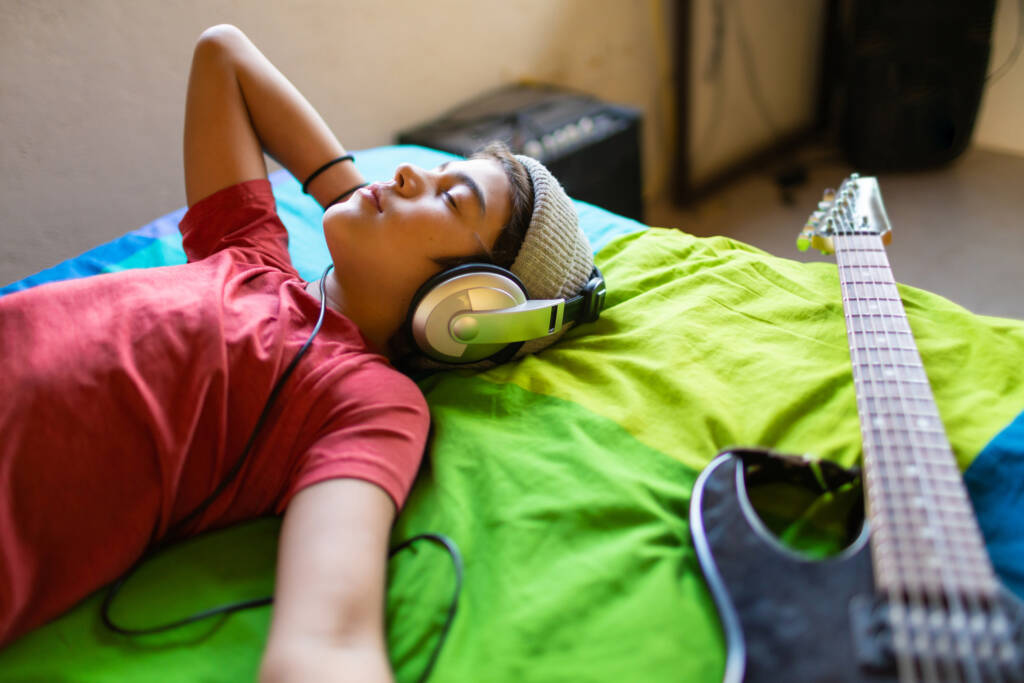
Middle School Exploring Music

What comes to mind when you hear the word ‘music’? Do you think about your favorite band or artist? Or do you think about instruments and scales and chords? The word music means something different to everyone. Which is why in this Music course, there’s a little bit of something for everyone! You will learn about how we hear music; how music affects our lives; important elements of music like rhythm, pitch, and harmony; different musical genres; singing and your voice; various instruments; music composition; and the history and culture of music over the years. Tune up your understanding and appreciation for all things music by signing up for this course!
Major Topics and Concepts
Unit 1: Intro to Music
- Reflect on the different places and times that music is heard
- Discuss the origin of music in human culture
- Summarize the roles that music plays in human society
- Understand the way our brain processes music
- Examine careers in the music industry
Unit 2: Elements of Music
- Tap the steady beat to any song
- Recognize note values and rhythms when written
- Understand how rhythm and melody work together
- Describe how a piano keyboard can help us understand steps, scales, and chords
Unit 3: Start with Your Ears
- Use active listening when enjoying a piece of music
- Apply the listening checklist to any piece of music
- Discuss the grand staff and how it relates to the musical elements
- Describe the importance of transcribing for musicians
Unit 4: Exploring the Voice
- Follow the five steps to reading a new piece of music
- Find the key signature, time signature, and your vocal part
- Use solfege syllables to begin singing new music
- Practice guidelines for vocal health to make sure your voice stays healthy and flexible
Unit 5: Instrumental Skills
- Identify the different instrument families
- Define the difference between classical music and world music
- Become familiar with world instruments
- Discuss musicianship and musical repertoire
Unit 6: Musical Cultures
- Understand why music developed differently in different times and places
- Summarize the history of music from the ancient period through the 20th century
- Distinguish the music of various genres
- Discuss the role of technology in the evolution of music
Unit 7: Dynamic Performing
- Discuss why preparation and musicianship are essential for an effective musical performance
- Identify signs of performance anxiety and develop tools to combat it
- Understand how to hold, tune, and use proper finger positioning on the guitar
- Practice a simple guitar progression
Unit 8: Composing and Arranging
- Discuss why the definition of a “good” composition will vary
- Craft melody and harmony
- Explain how a melodic motive and chord progression work together
- Utilize various compositional techniques such as repetition, contrast, and variation
Competencies
Music Fundamentals
Students will demonstrate an understanding of music fundamentals by describing the origins of music, summarizing the biological basis of sound, and explaining careers in music.
Elements of Music
Students will demonstrate an understanding of the elements of music by explaining the main notes in rhythm, describing the elements of pitch, explaining the relationship between harmony and melody, and explaining the relationship between notes.
Listening to Music
Students will demonstrate an understanding of listening to music by describing the active listening of music, explaining the relationship between timbre and instruments, and explaining expressive elements of music.
Steps to Sight Reading
Students will demonstrate an understanding of the steps to sight reading by describing the function of the key signature, explaining the functions of time signature and vocal part, and explaining the functions of rhythm and pitch.
Instrumental Skills
Students will demonstrate an understanding of instrumental skills by describing the families of instruments and differentiating between classical and world music.
Musical Cultures
Students will demonstrate an understanding of musical cultures by explaining periods of music and differentiating music genres.
Musical Performance
Students will demonstrate an understanding of musical performance by explaining preparation steps for musical performance, explaining musical elements for consideration for performance and describing guitar fundamentals.
The Composing Process
Students will demonstrate an understanding of the composing process by explaining the factors in writing a melody, explaining the factors in crafting the chord progression, and explaining the use of compositional techniques.

